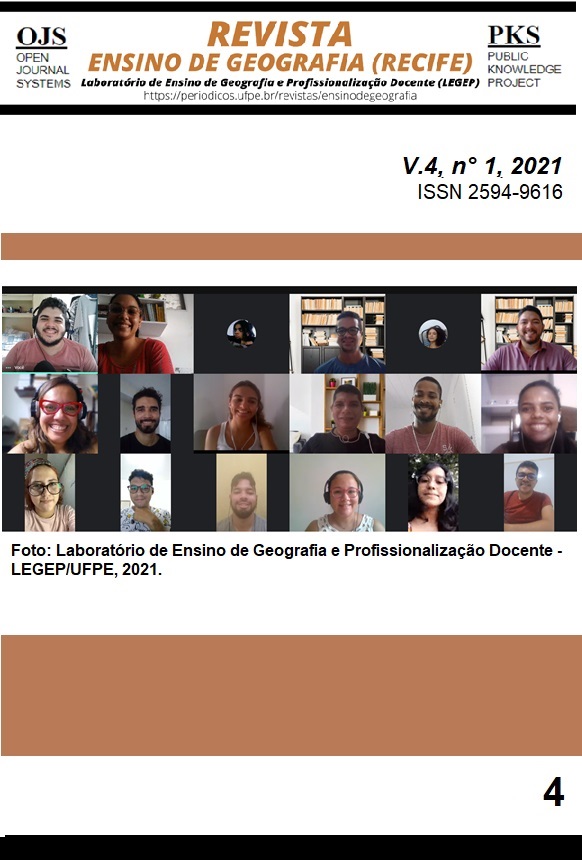Libertary songs in teaching: understanding the “sertão nordestino” in school geography
DOI:
https://doi.org/10.51359/2594-9616.2021.248775Keywords:
Musical art, teaching tools, country landscapeAbstract
The present work originates from a degree project in Geography, focusing on the perspective of the arts as a reading of Latin American heritage landscapes. Based on some principles of libertarian and phenomenological approaches of school geography to understand the subject's power in his daily actions, he appropriated an artistic tool, the musical song, still considered “alternative” in basic education. The content worked through the classroom intervention was Sertão Nordestino. And the songs were selected by associative contrast (traditional X unusual). Bearing in mind that art music is a carrier of geography, we sought to understand the country landscape as an understanding of a lived world, without formal plasterings and accessible to the student. The result of the proposed reflection demonstrates musical possibility in the classroom, as an easy and competent strategy for understanding geographic content.
References
AUSUBEL, D.P. (2003). Aquisição e retenção de conhecimentos: uma perspectiva cognitiva. Lisboa: Plátano Edições Técnicas.
CARNEY, G. O. Música e lugar. In: CORRÊA, R. L.; ROSENDAHL, Z. (Orgs.). Literatura, música e espaço. Rio de Janeiro: EdUERJ, 2007. p. 123-150.
CORREIA, A. C. S.; SÁ, L. A. C. M. de. Mapas mentais na construção do conhecimento para geração de bases de dados espaciais. Boletim de Ciências Geodésicas, Curitiba, v. 16, n. 1, p. 39-50, mar. 2010. Disponível em: https://revistas.ufpr.br/bcg/article/view/17243. Acesso em: 28 out. 2020.
ELIADE, M. Imagens e Símbolos. 768. ed. Lisboa: Arcadia.
FERREIRA, M. Como usar a música na sala de aula. 2. ed. São Paulo: Contexto, 2002. 238 p. Coleção como usar na sala de aula.
FREIRE, P. Pedagogia do Oprimido. São Paulo: Paz e Terra. Pp.57-76. 1996. Disponível em: <https://edisciplinas.usp.br/pluginfile.php/610265/mod_resource/content/2/Texto6-Freire-1parte.pdf>. Acesso em: 29. mar. 2020
KAERCHER, N. A. Das coisas sem Rosa uma delas é o Pessoa: as geografias do Manoel e do Nestor na busca do bom professor. In: TONINI, I. M. et al (Org.). O ensino de Geografia e suas composições curriculares. Porto Alegre: Ed. Ufrgs, 2011. p. 205-220
KROPOTKIN, P. What Geography Ought to Be. The Nineteenth Century, Londres, v. 18, 1885. Disponível em: http://dwardmac.pitzer.edu/anarchist_Archives/kropotkin/whatgeobe.html. Acesso em: 8 fev. 2020.
LIPIANSKY, E. M. A Pedagogia Libertária. Manaus: Editora Imaginária, 2007. 88 p.
LOWENTHAL, D. Geografia, experiência e imaginação: em direção a uma epistemologia geográfica. In: CHRISTOFOLETTI, A et al (Org.). Perspectivas da geografia. São Paulo: Difel, 1982. p. 103-141.
MARANDOLA JUNIOR, E.; OLIVEIRA, L. de. Geograficidade e espacialidade na literatura. Geografia, Rio Claro, v. 34, n. 3, p.487-508, dez. 2009. Disponível em: https://www.periodicos.rc.biblioteca.unesp.br/index.php/ageteo/article/view/4795/3949. Acesso em: 11 fev. 2020.
Downloads
Published
How to Cite
Issue
Section
License
Copyright (c) 2021 Léon Denis Ferreira Xavier, Christian Dennys Monteiro de Oliveira

This work is licensed under a Creative Commons Attribution 4.0 International License.
Authors who publish with this journal agree to the following terms:- Authors retain copyright and grant the REVISTA ENSINO DE GEOGRAFIA (RECIFE) right of first publication with the work simultaneously licensed under a Creative Commons Attribution NonCommercial International 4.0 (CC BY-NC) that allows others to share the work with an acknowledgement of the work's authorship and initial publication in this journal.
- Authors are able to enter into separate, additional contractual arrangements for the non-exclusive distribution of the journal's published version of the work (e.g., post it to an institutional repository or publish it in a book), with an acknowledgement of its initial publication in this journal.
- Authors are permitted and encouraged to post their work online (e.g., in institutional repositories or on their website) prior to and during the submission process, as it can lead to productive exchanges, as well as earlier and greater citation of published work.



